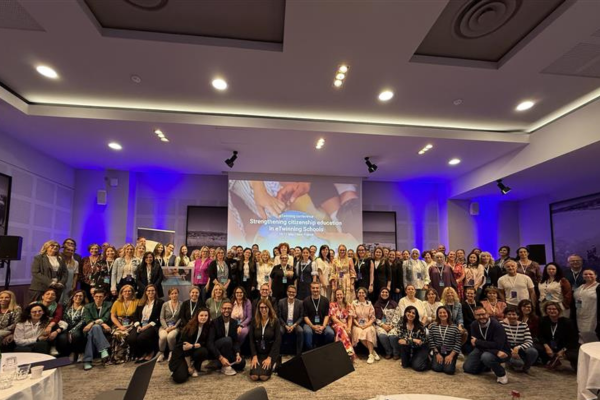
2025 European conference for eTwinning Schools in Nice

The Strengthening citizenship education in eTwinning Schools conference took place on 16−17 May 2025 in Nice, France. The event welcomed 100 participants onsite and 95 online, with a further 150 viewers joining via YouTube livestream.
Participants discussed how to encourage inclusivity, democratic participation and critical thinking in schools while building new connections for future citizenship education projects.
Day 1: Exploring civic education in theory and policy
The conference was opened by Amy Burnett from the European Commission Directorate-General for Education and Culture. She emphasised the fundamental role of citizenship education in today’s world, underlining the importance of values such as tolerance, inclusion, mutual understanding and collaborative learning in educational settings.
‘eTwinning projects are a collaborative effort between students and teachers to make these shared values into a lived experience, making sure that young people grow up to be informed, engaged citizens.’
Gaël Le Dréau, Director for Europe and International at Réseau Canopé, representing the French National Support Organisation, highlighted the empowering nature of eTwinning:
‘Through eTwinning we do not just exchange practices, we compare, we contrast, and we challenge ourselves’
The first keynote speaker, Marcin Szala, co-founder and head of Liceum Artes Liberales, presented innovative approaches to frameworks for civic education.
He discussed how educators can integrate civic education into existing curricula, promote active participation and support learners in acquiring the knowledge, skills and dispositions necessary for responsible citizenship.
‘Being a teacher nowadays is being someone who is an architect of an experience, being an architect of a community, who is an architect of possibility. And not only what we say, not only the content of what we teach about, the very fabric, how we operate, is a powerful experience that is formative and is teaching itself to the students.’
In the second keynote, Irene Pateraki, from the Central Support Service, explored the importance of involving pupils in citizenship education from an early age.
She discussed how eTwinning Schools can foster active citizenship by embedding democratic values, critical thinking and student agency into everyday learning:
‘We need to trust our pupils and make democratic thinking part of everyday classroom life.’
The recording of the first day is available to the public on YouTube.
Day 2: Citizenship into practice
The second day was dedicated to workshop sessions and practice-sharing.
Workshops topics included:
- Connecting educational institutions with their local communities
- Critical thinking strategies, to turn pupils into agents of change
- Debating skills to empower pupils’ voices
- Promoting media literacy and youth citizen journalism
- Project-based learning as a catalyst for motivation and participation
During the practice session, participants shared the outcomes of the networking activity, in which they were asked to work together on issues by assuming different roles in a school setting. The objective was to collaborate to identify and propose a range of possible solutions, and spark new collaborations.
The recording of the second day is available to the public on YouTube.
Find out more about eTwinning Schools.
Additional information
-
Education type:School Education
-
Target audience:TeacherStudent TeacherHead Teacher / PrincipalLibrarianPedagogical AdviserTeacher EducatorResearcher
-
Target audience ISCED:Primary education (ISCED 1)
